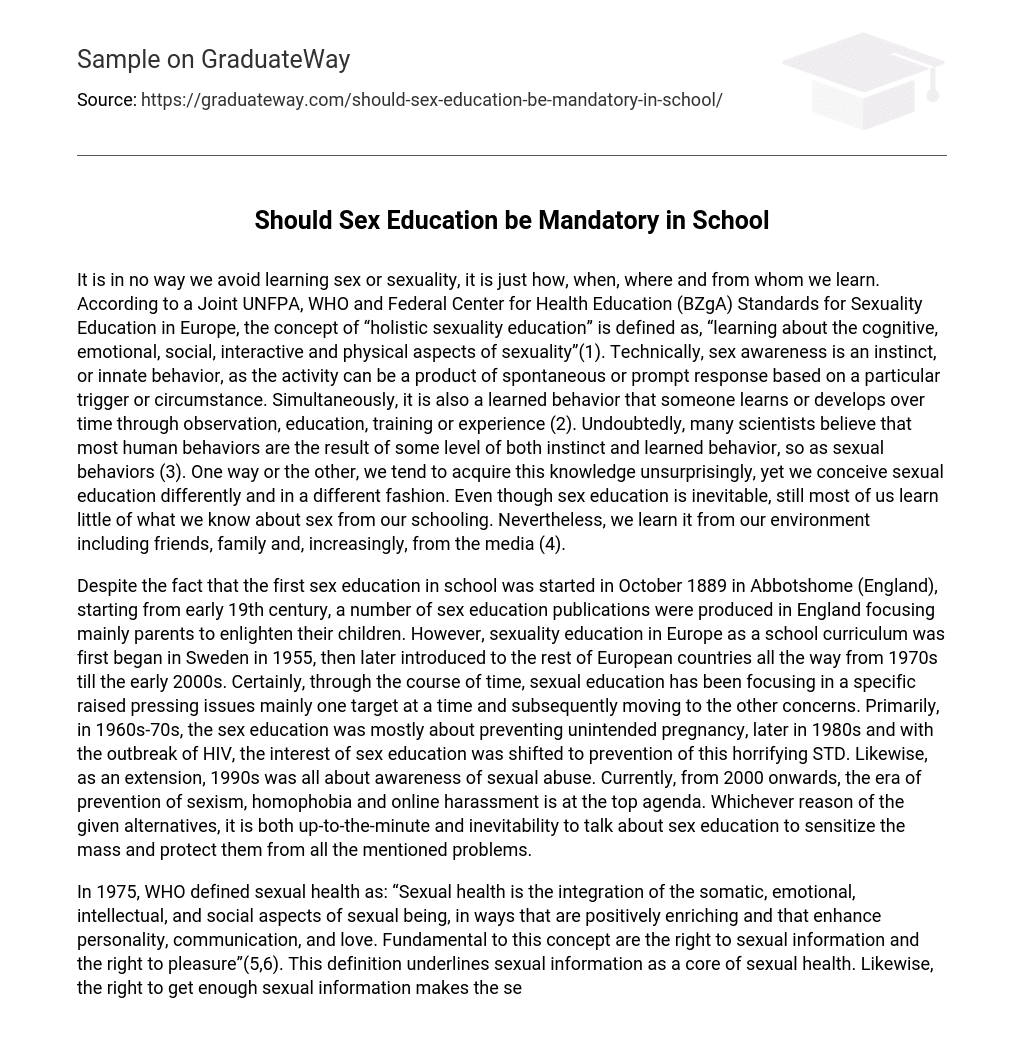It is in no way we avoid learning sex or sexuality, it is just how, when, where and from whom we learn. According to a Joint UNFPA, WHO and Federal Center for Health Education (BZgA) Standards for Sexuality Education in Europe, the concept of “holistic sexuality education” is defined as, “learning about the cognitive, emotional, social, interactive and physical aspects of sexuality”(1). Technically, sex awareness is an instinct, or innate behavior, as the activity can be a product of spontaneous or prompt response based on a particular trigger or circumstance. Simultaneously, it is also a learned behavior that someone learns or develops over time through observation, education, training or experience (2). Undoubtedly, many scientists believe that most human behaviors are the result of some level of both instinct and learned behavior, so as sexual behaviors (3). One way or the other, we tend to acquire this knowledge unsurprisingly, yet we conceive sexual education differently and in a different fashion. Even though sex education is inevitable, still most of us learn little of what we know about sex from our schooling. Nevertheless, we learn it from our environment including friends, family and, increasingly, from the media (4).
Despite the fact that the first sex education in school was started in October 1889 in Abbotshome (England), starting from early 19th century, a number of sex education publications were produced in England focusing mainly parents to enlighten their children. However, sexuality education in Europe as a school curriculum was first began in Sweden in 1955, then later introduced to the rest of European countries all the way from 1970s till the early 2000s. Certainly, through the course of time, sexual education has been focusing in a specific raised pressing issues mainly one target at a time and subsequently moving to the other concerns. Primarily, in 1960s-70s, the sex education was mostly about preventing unintended pregnancy, later in 1980s and with the outbreak of HIV, the interest of sex education was shifted to prevention of this horrifying STD. Likewise, as an extension, 1990s was all about awareness of sexual abuse. Currently, from 2000 onwards, the era of prevention of sexism, homophobia and online harassment is at the top agenda. Whichever reason of the given alternatives, it is both up-to-the-minute and inevitability to talk about sex education to sensitize the mass and protect them from all the mentioned problems.
In 1975, WHO defined sexual health as: “Sexual health is the integration of the somatic, emotional, intellectual, and social aspects of sexual being, in ways that are positively enriching and that enhance personality, communication, and love. Fundamental to this concept are the right to sexual information and the right to pleasure”(5,6). This definition underlines sexual information as a core of sexual health. Likewise, the right to get enough sexual information makes the sex education increasingly significant. Thus, according to WHO, delivering appropriate sex education at a school level is considered as a duty of countries to practice the right of their citizens.
In contrary to what is said, some people proposed to discourage the advocacy of sex education. They proclaim that, sex is a biological instinct given by a nature for procreation and no sex education was arranged to our ancestors, yet humanity has been progressing (7). Based on their argument, considering sex education as a basic necessity and making it mandatory in schools’ curriculum is rather premature idea as young people has the tendency to practice what they know. As a matter of fact, they claimed that teen and unintended pregnancy is as a result of this untimely information to a school kids in schools and in a media (8,9). Few studies done about the effects of sex education on teen sexual activity and teen pregnancy somehow supported the notion to some extent (10). Otherwise, school sex education and teen pregnancy is rather less supported by evidence as several studies underline the significance of sex education in teen pregnancy and STI prevention (11–13). However, studies also proven to the ineffectiveness of some methods of sex education like abstinence-only as a policy in preventing teenage pregnancy in U.S and may actually be contributing to the high teenage pregnancy (14) . Even though people might stay critical on the mandatory delivery of sex education in school, it is the mode and the technique of delivery that counts and ultimately determines the overall effect. A systematic review study clarifies this ambiguity by underline “school sex education courses appear to facilitate attitudinal change in student tolerance of the sexual practices of others, but the personal value system of the student remains intact. Such programs appear to have little effect on the amount of sexual behavior while increasing the use of contraceptive methods among sexually active students” (15) .
School sex education increases the knowledge, normalize sexual issue and above all improve self-efficacy of a young adult. To demonstrate that, one meta-analysis illustrates a school-based sex education as an effective strategy for reducing HIV-related risk, where students who received school-based sex education interventions had significantly greater HIV knowledge (Hedges g = 0.63, 95% Confidence Interval (CI): 0.49–0.78, p
It looks wise for me to conclude this argument from my recent devastating experience that happens in Barentu, the peripheries of my own country Eritrea, where 4 high school students out of 8 signed up to donate blood to their anemic classmate were found to be HIV positive. Though the news was obscured by the authoritarian regime, the truth exists. The current curriculum we have in my country does not include sex education as a subject in a curriculum nor it is taught in the school appropriately. With the termination of the former of HIV prevention campaigns, the young students remain vulnerable. Thus, sex education should be mandatory to address all the dynamics of sexuality in human being.





